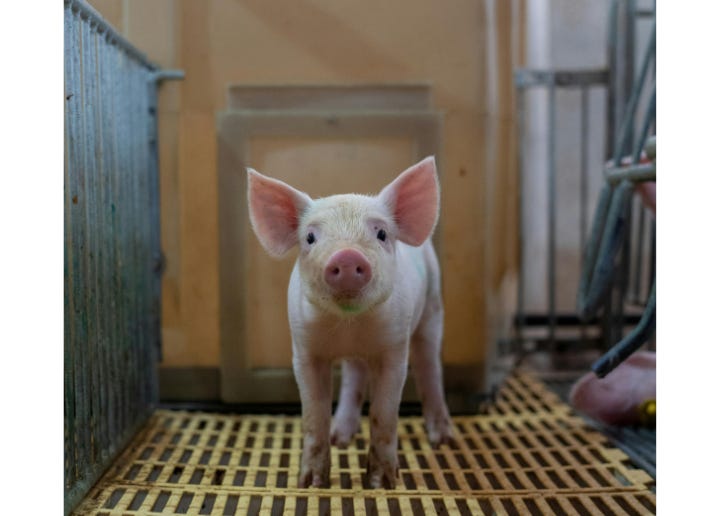“If you saw me as I am—not bacon, not pork, but a thinking, feeling being—would you still take my life? I am not a product. I am not yours to use. I want to live, just as you do. Please, choose compassion over tradition.”
My name is unknown to you, but I was born into this world not to live, but to be used. From the moment I took my first breath, my fate was already sealed. Unlike the dogs humans cherish as companions, I was never meant to be loved. I was born into a system that values my body as a commodity rather than my existence as a sentient being. But I do exist. I think, I feel, I remember. So why is my life worth less than yours? This is the question I pose to you—the one who decides whether I live or die, whether I am seen or ignored. From my perspective, the ethics of eating animals is not a complex philosophical debate; it is a matter of survival, of justice, of a right I am never granted—the right to live.
The Value of My Life
If you took a moment to truly see me, you would know that I am not so different from the animals you adore. I play, I love, I dream, and I fear. I have a mother who cared for me, just as human mothers do. I have friends, ones I nuzzle close to for warmth and safety. I even have preferences—I enjoy belly rubs, I recognize the faces of those I trust, and I have been known to outsmart even the cleverest humans in puzzle-solving games. Science confirms what I already know: pigs are as intelligent as dogs, as emotionally complex as primates, and as capable of suffering as any human child.
Yet, despite all of this, I am seen only as food. Why is it that humans cherish one species and consume another? Why is my suffering invisible while a dog’s whimper elicits immediate sympathy? If my life matters to me, why doesn’t it matter to you?
The Injustice of Factory Farming
Unlike the images humans like to believe—of pigs rolling in open fields, basking in the sun—I have never felt grass beneath my hooves. I was born in a metal crate, my mother confined so tightly she couldn’t turn around to nuzzle me. I was separated from her far too soon, her cries echoing through the walls as I was taken away. My brothers and sisters were crammed into pens so crowded we could hardly move, our tails cut off without pain relief to prevent the frustration-induced biting that inevitably comes from such confinement.
The air is thick with ammonia, the stench of waste burning my nostrils. We are fed until we are deemed ready—ready to be transported in overcrowded trucks, without food, without water, without comfort. Some of us die before we even reach the slaughterhouse, from heat, from exhaustion, from fear. But those of us who survive face the final betrayal: the cold steel of the killing floor. I scream, but no one listens. I struggle, but it does not matter. My life—full of memories, of love, of longing—is ended in a moment, reduced to nothing more than a neatly packaged slab of meat.
The Hypocrisy of Humane Labels
I have heard the words humans use to soothe their conscience—"humane slaughter," "free-range pork," "grass-fed." But let me ask you this: Is there a kind way to take a life that does not want to be taken? A gentle way to slit a throat? A compassionate way to kill someone who does not wish to die?
Even on the so-called "ethical" farms, the outcome is the same. My death is not a peaceful one. No matter how much space I am given, no matter how fresh my food may be, I still end up in the same slaughterhouse. I am still reduced to a product. A kind execution is still an execution. And if kindness is the goal, why not let me live?
The Alternatives to Eating Me
I do not ask for much—only the right to live the life I was meant to live. And the truth is, you do not need my flesh to survive. You have choices. Your ancestors may have needed to consume animals to endure harsh environments, but you, with your abundance of plant-based foods, do not. You have lentils, beans, grains, vegetables—foods that provide all the nourishment your body needs without requiring my suffering.
Even if you crave the taste of my flesh, there are alternatives. Scientists have created plant-based meats that look, taste, and cook just like the ones made from my body—without the bloodshed. Some humans are even growing meat in labs, removing the need to kill altogether. The future does not demand my sacrifice; only your traditions do. And traditions can change. They should change when they cause harm.
A Plea for Change
I do not have a voice that you understand, but I have a plea: See me. See me for what I am—not as food, not as property, but as an individual with a life I do not want to lose. If you had to look into my eyes before you ate me, would you still do it? If you had to feel my fear, hear my screams, witness my suffering firsthand, would you still take my life for the sake of a meal?
I am not asking for your kindness in my final moments. I am asking for something greater—for the right to exist, to live without suffering, to be free from the fate humans have imposed upon me. You hold the power to make that choice. You can choose compassion over cruelty, justice over convenience, life over death. And if you do, I will not have died in vain.
Because I want to live. Please, let me.
Further Reading
Making a Stand for Animals by Oscar Horta.




